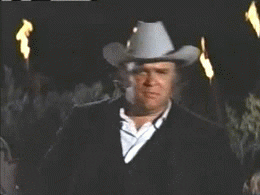The history of America is summed up in one brief scene of Blazing Saddles, Mel Brooks’ ridiculous, exuberantly rude 1974 masterpiece.
I’ve linked to that video without embedding it because, like any minute-long slice of Blazing Saddles, it’s Not Safe for Work. The scene — watch it here after the kids are in bed — includes two ethnic slurs, one curse word, and one sacrilegious joke involving masturbation (so overall, it’s pretty tame compared to the rest of the movie).
 The white citizens of Rock Ridge have only one night to accomplish a nearly impossible feat (building a life-size replica of the town in order to … nevermind, it’s silly and too complicated to summarize, just watch the movie sometime if you haven’t already). They need help to survive, and help arrives in the form of black, Chinese and Irish railroad workers — people despised by the cheerfully racist white townsfolk. The sheriff, Cleavon Little, convinces them that they need the workers’ help, and that all the workers’ “ask in return is a little plot of land they can call their own to homestead.”
The white citizens of Rock Ridge have only one night to accomplish a nearly impossible feat (building a life-size replica of the town in order to … nevermind, it’s silly and too complicated to summarize, just watch the movie sometime if you haven’t already). They need help to survive, and help arrives in the form of black, Chinese and Irish railroad workers — people despised by the cheerfully racist white townsfolk. The sheriff, Cleavon Little, convinces them that they need the workers’ help, and that all the workers’ “ask in return is a little plot of land they can call their own to homestead.”
Olson Johnson (played by the Big Lebowski himself, ubiquitous character actor David Huddleston) speaks on behalf of the townspeople: “All right. We’ll give some land to the [black workers] and the [Chinese workers]. But we don’t want the Irish!”
The workers reject this compromise, and Johnson relents. “Awww, prairie-s–t,” he says. “Everybody!”
It’s a crude, yet weirdly layered little joke mocking our capacity for prejudice, but it also captures the great American story. The idea of equality arose not just as an ideal principle, but as a grudging concession to necessity, a pragmatic recognition that we need each others’ help to survive. But regardless of how we arrived there, once we bound ourselves to this ideal of equality, we were bound to its expansive, inclusive logic and to recognizing — even if it takes us a while — that equality is meaningless unless it includes “Everybody.”
In a recent essay for The Washington Post, Charles C. Haynes describes how something like this scene from Rock Ridge pushed America toward the religious liberty and religious pluralism that equality requires:
Drafters of the Constitution took the radical step of founding the first nation in history with no established religion.
Truth be told, they had little choice.
Religious divisions among the many Protestant sects in 18th-century America were deep and abiding. Anglicans, Quakers, Baptists, Congregationalists and many others fought bitterly over what it meant to be “Christian” – although almost all could agree that “Papists” (Roman Catholics) were followers of the anti-Christ.
In other words, religious diversity at America’s founding made a necessity of religious freedom because no one group had the power or the numbers to impose its version of true faith – Christian or otherwise – on all others.
Haynes notes that initial hostility to “Papists” — a literal expression of “But we don’t want the Irish” that lingered for centuries. Jews, too, were initially seen by many as beyond the scope of legitimate religious diversity — even despite George Washington’s own defiant affirmation of their religious freedom in his “To Bigotry No Sanction” letter. And the same has been true for every religious minority — free-thinkers, Mormons, Muslims, Pagans, and every other group that could be regarded as Other by the Protestant Christian majority.
Many Americans still insist on making exceptions and exclusions — “But we don’t want the atheists” or “But we don’t want the Muslims.” And some imagine that their sect or their alliance of sects might even now have the power or the numbers to cast aside the ideal of equality entirely and claim a right to impose its version of true faith on everyone else.
Haynes notes that this nonsense is particularly popular among evangelical Christians, but not exclusive to them:
A majority of the American people (51 percent) believes that the U.S. Constitution establishes a Christian nation, according to the State of the First Amendment survey released last month by the First Amendment Center.
Because language about a Christian America has long been a staple of Religious Right rhetoric, it’s not surprising that acceptance of this patently false interpretation of the Constitution is strongest among evangelicals (71 percent) and conservatives (67 percent).
But even many non-evangelical Christians (47 percent) and liberals (33 percent) appear to believe the fiction of a constitutionally mandated Christian America is historical fact.
His response to that is blunt and to the point:
Forgive me for being snippy, but read the Constitution.
That’s a good response. Or we could just quote Olson Johnson: “Prairie-s–t.”












